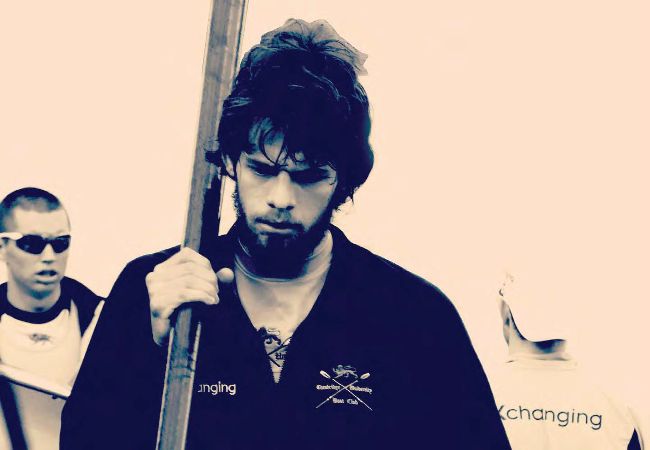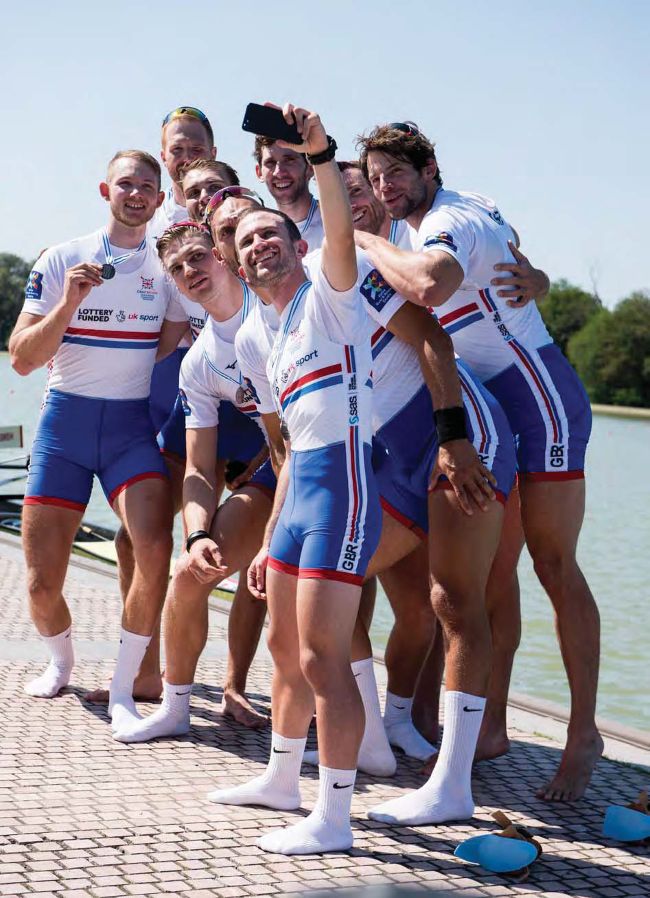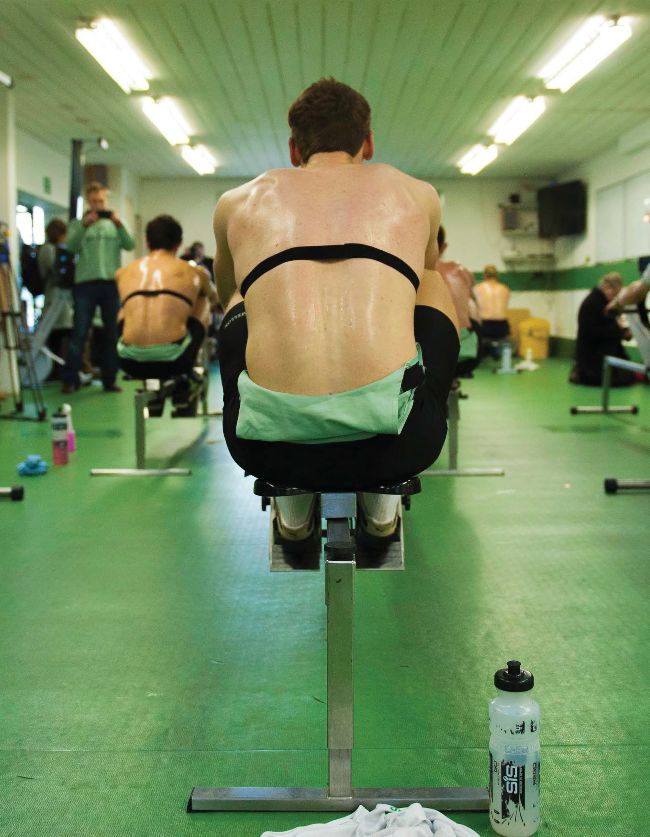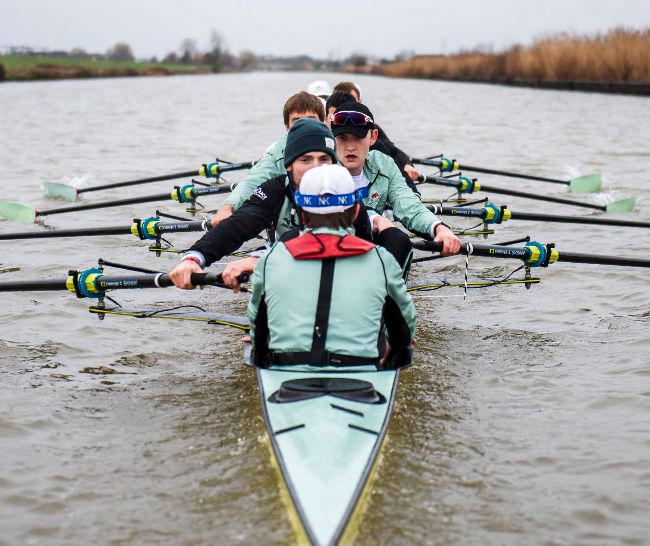Blue Life
Behind the scenes with a Boat Race oarsman
WORDS: TOM RANSLEY / PHOTOGRAPHY: BENEDICT TUFNELL

Tom Ransley is a Cambridge Blue, GB Olympic gold medallist, and Row360’s Contributing Editor
I wake up on top of ‘Margaret Thatcher’. I peel the book from my face and place it on a photograph of ‘My Bed’. The desk is a mess of scattered notes taken from Tracey Emin’s ‘Strange-land’, and Shakespeare’s ‘Macbeth’. I feel terrible. My eyes are red-rawsore. My body aches. It seems as if my recent existence has been a hazy state of constant fatigue. I push back from the desk and lift myself off the chair. As I stand a gnawing pain scurries up my spine. It is 3am. There’s less than three hours until the alarm goes off. I walk to the bathroom. A blurred image stares out from the mirror. I feel haggard. Red ink has leaked onto my writing hand, I try to wash it off. I give up on the stubborn stain and peel the dry contacts from my eyes. Its like they’ve been glued in. By the time I flick them into the bin my eyes are angry and blood shot. Welcome to the life of a Boat Race oarsman.
The alarm shrieks beside my skull; whirling dreams evaporate and reality drifts into view. I stop the alarm but the absent noise still resonates in my body and creates a wave of sickness. An icy bike ride, before the winter sun has risen, dispels the nausea. I get changed quickly and meet the team in the gym. I approach the ergo with all the joy of a condemned man. Ninety miserable minutes later I race out of the boathouse and head to my first lecture. As I leave I notice one team member looking particularly sullen.
“The fight is won or lost far away from witnesses - behind the lines, in the gym and out there on the road, long before I dance under the lights.”
- MUHAMMAD ALI
Surprisingly the lecturer begins by quoting Julian Barnes: “What you end up remembering isn’t always the same as what you have witnessed.” I sit, silent and sleepy. I want to pay attention but the fatigue is killing me, my mind keeps returning to last night’s essay. I am only 300 words in, and struggling with the title. The lecturer concludes the presentation, again quoting Barnes: “History is that certainty produced at the point where the imperfections of memory meet the inadequacies of documentation.”
Back on the bike I leave the History Faculty and dash across town. Pedalling furiously, I risk the wrath of the Cambridge traffic to ensure I get to college in time to microwave a potato. Wrapped in tinfoil I sling the unorthodox lunch into my kit bag. Another stint on my beaten-up old bike, across Jesus Green, over the Cam, and I glide into Goldie boathouse with seconds to spare.

Tom Ransley with the British eight in Plovdiv, 2018.
I hop on the Light Blue bus and shuffle past the team. The back seats are free so I sit down to enjoy the potato and contemplate the central argument of my essay. As the doors close I notice we are missing an athlete. The same athlete who looked so sullen earlier this morning. Before I could make too much commotion someone tells me the athlete was cut. After the morning ergo the unfortunate, now former team member, was called into the coaches’ office and received the crushing news of his immediate removal from the squad. He had even left some kit behind, too despondent from redundancy to retrieve it. It bugged me that the coach did not break the news to him the night before, so he could have had a lie in. At the very least, he should have been told before completing over an hour of mind-numbing back-breaking indoor rowing at 6am. As the weeks and months passed, the numbers in the bus dwindled. You were never far from a reminder that this was a selective process.
Ely is a 40-minute drive from Cambridge. We leave the eclectic row of boathouses that line the Cam and head to a remote stretch of the Great Ouse. Unlike the meandering and crowded Cam, our stretch of water feels lonely and linear. Unending riverbanks carve through the Fens, penetrating a landscape of stark natural beauty. Ely Cathedral bears witness to the start and eventual finish of our long session. I don’t think the potato was enough. With all its starchy goodness sucked dry I succumb to a hypoglycaemic state of floaty-ness.
Back in the boat shed we debrief the session. With its arching tin roof and basic brickwork, the boat shed resembles an old war bunker. For what it lacked in comfort it made up for in grit. It was at the heart of every CUBC boat race campaign. I enjoyed the unpretentious and hardy nature of the place but it was difficult to love when the heating gave up in the middle of winter. Likewise, my fondness for this tattered shelter was tested the year a mystery odour began to pervade every corner. The source of this steadily strengthening stench turned out to be a rat that had crawled beside a heating pipe in the summer and died, only for its rotting carcass to be warmed throughout the following winter. Death warmed up. Above the window hung a faded picture of the great Muhammad Ali with the words: “The fight is won or lost far away from witnesses - behind the lines, in the gym and out there on the road, long before I dance under those lights.”
“The complete exhaustion, combined with the onset of dejection and the cold at the finish line, makes for foggy memories.”
In my first year at Cambridge I managed to secure myself a seat in the blue boat. A Boat Race campaign lasts about 180 days. The long awaited race day had finally come.
The crew spent the morning cooped up at London Rowing Club (LRC). The hours dragged. Eventually, unbeknown to the crowds in front, we left LRC. We went through the fire exit, at the side of the building, down the metal staircase, and along the overgrown path that connected the two clubs. Led like animals at an abattoir, we passed behind the boathouses until we reached an old doorway. We filed into the back of a dark boat bay. These were the final moments on land. A last chance to focus the mind and collect one’s thoughts. One final crew briefing, a few words of encouragement, and the time had come. We lifted the boat onto our shoulders. The boat bay doors were pulled apart and we stepped out into the glare of the media and the cries of the crowd. On the water the warm-up went to plan. We pulled up under Putney Bridge and then took the last few strokes to the start line. I could hear a group of protesters whistling. Helicopters whirred overheard. There was a dryness at the back of my throat. The dryness caught at the back of my mouth. Attention. Go!

“What appeals to me, as it does for many, is the brutality and simplicity of the race.”
The battle was lost and won. I refused to accept the inevitable. But, it was clear to the millions watching that Cambridge had lost. We had thrown absolutely everything at the race. We had defended against their early advantage and then buried ourselves to create a winning opportunity. An opportunity that never quite stuck. Those decisive moments were miles past and now there was nothing left. The race was all but over. It was a slow and painful death. Delivered on an unrelenting headwind the cold rain lashed at our backs. Whilst the bows of the boat crashed through the rough tideway waves. The outside conditions were bleak but, no doubt, less bleak than those now in the mindscape of the Light Blue boat. The fatal blow had been delivered by Oxford somewhere past halfway. The lifeblood of the race had whole heartedly flowed out in the final stages. Both crews rounded the last Middlesex bend in procession, Oxford had attained an insurmountable lead.
My recollection of the race beyond Barnes Bridge is patchy at best. I know there was a point where my legs felt beyond empty and despite asking for more there was nothing left. The complete exhaustion, combined with the onset of dejection and the cold, at the finish line makes for foggy memories. A thought took hold whilst staring at the back of my crewmate. Twice before he had raced, and twice before he had lost. Now on his last attempt, he lost again. The build up to the race was streaked with adversity. Most notably our strokeman was forced to pull out due to a heart condition. The dream of winning the Boat Race lay in tatters. I felt a heavy disappointment. We had failed the club, the coaches and our supporters. What appeals to me, as it does for many, is the brutality and simplicity of the race. Win or lose. No silver medals. It remains one of the toughest defeats I have had to overcome.

Eventually I make it back to college. A persistent hangover clouds an already dark mood. I click the ‘essays’ folder, and open the document titled: “The Falsehood of Memory: Thatcher’s Impact on the Young British Artists” An image of Tracey Emin’s ‘My Bed’ covers the first page, and her own words below it: “What is truth? Truth doesn’t really exist.”